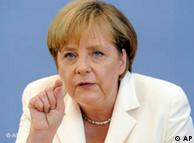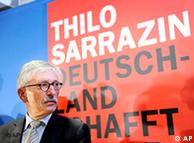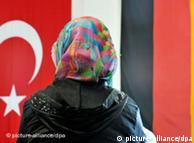INTEGRATION | 05.09.2010
Muslim youth violence is a problem in Germany, says Merkel
Speaking to German weekly Bild am Sonntag, Angela Merkel said it would be wrong to play down statistics that show religious Muslim youths in Germany to be more prone to violence than the rest of the population.
"This is a big problem and we can talk about it openly, without arousing suspicions of xenophobia," Merkel said in the interview published on Sunday, September 5.
 There is more work to do on subject of immigration, says Merkel
There is more work to do on subject of immigration, says Merkel
But Merkel warned against automatically linking certain religions with violence.
"This is misleading," she said. "Violence among young people is often a sign that they see no perspective for themselves. All that helps is education, education, education."
"Our state is making many offers, but the main responsibility lies with the parents, and cannot be taken on by schools or the state," Merkel added.
Merkel said it was crucial to maintain law and order in violent city districts with high migrant populations. She said one solution would be to hire more civil servants with a foreign background.
"It would surely help if we had more migrants in the police, youth welfare offices and other authorities," she said.
Sarrazin debate
Her comments came after Germany's central bank voted on Thursday to sack its controversial member Thilo Sarrazin, who sparked outrage and debate with claims in his new book that Muslim immigrants are lowering German intelligence and harming society more than they contributed to it.
 Sarrazin's book has caused an uproar in Germany
Sarrazin's book has caused an uproar in Germany
Sarrazin, a member of the Social Democratic Party (SPD) received partial backing from party leader Sigmar Gabriel, who said there was an element of truth in his book, entitled "Germany Abolishes Itself."
"I think we are experiencing much of what he is describing in (the book). There is no question," Gabriel said.
He did not, however, share Sarrazin's thesis that Muslim integration problems resulted from genetic predispositions.
The SPD has initiated procedures to evict Sarrazin from the party, while the central bank has asked President Christian Wulff to approve his dismissal from the bank's board.
The German government's official in charge of integration, Maria Boehmer, acknowledged that there were problems in conveying immigration policy.
"The gap between the population and politics concerns me," Boehmer told Focus magazine. Reaction to the Thilo Sarrazin case shows "that we have to take the offensive and talk about problems and successes of (our) integration policy".
Legal challenge
Sarrazin has threatened to go to court to prevent his dismissal from the Bundesbank. In extracts from an interview with the news weekly Focus, released ahead of Monday's publication, Sarrazin likened a wave of criticism of him to a "political show trial."
He said if German President Christian Wulff approved his sacking in the next few days, the decision would be overturned by the justice system.
"The president will have to consider carefully whether he wants to see this political show trial to its end, and then see (his decision) thrown out by the courts," Sarrazin said.
Rules designed to protect the Bundesbank's independence mean the German president's approval must be sought for the dismissal of a board member -- something that has never happened since it the institution founded in 1957.
Author: Nigel Tandy (Reuters/dpa)
Editor: Toma Tasovac


No comments:
Post a Comment